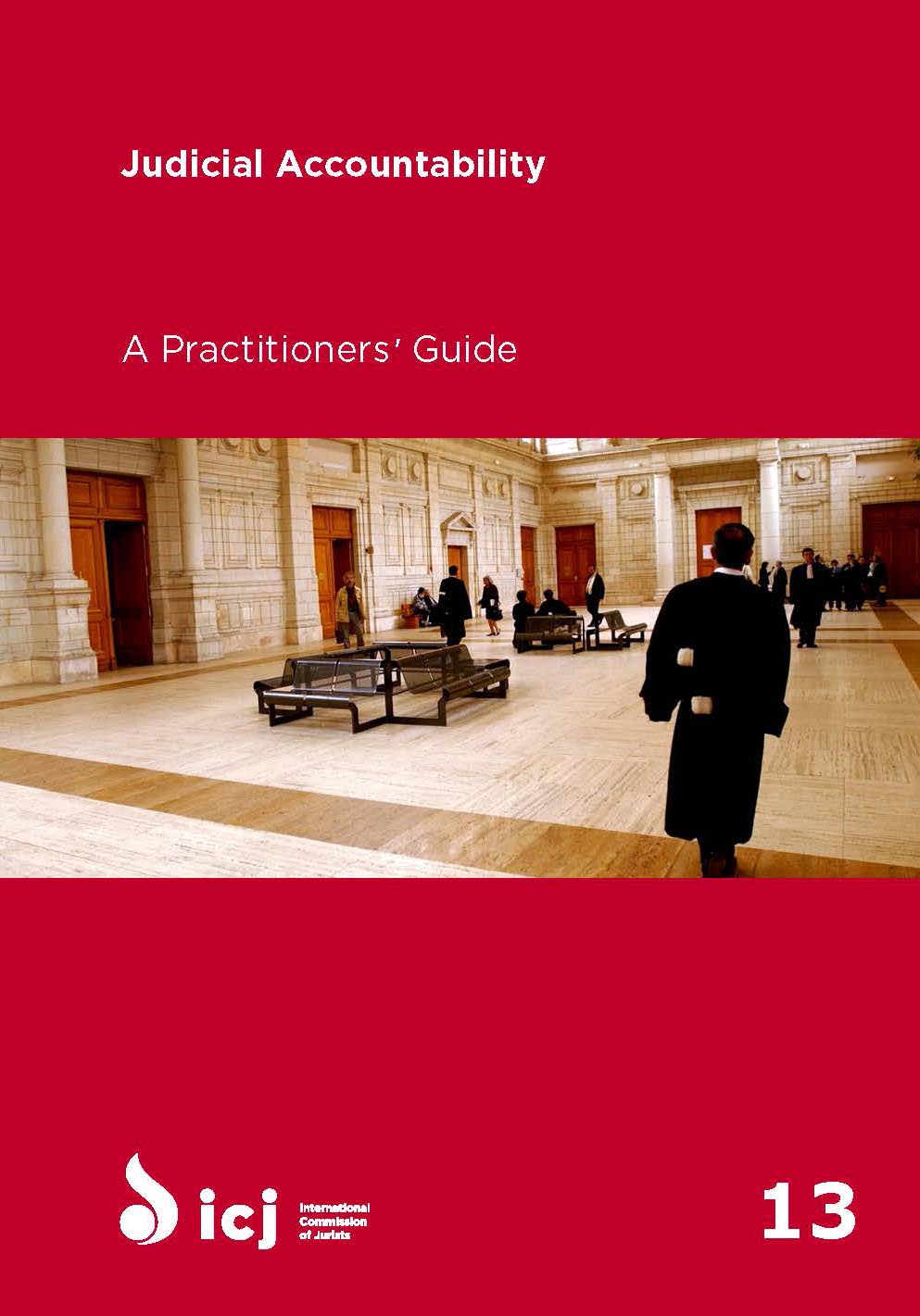ICJ Practitioners Guide No. 13 on Judicial Accountability addresses mechanisms and procedures to ensure accountability for serious judicial misconduct, such as corruption or complicity in human rights violations, while preserving the independence of the judiciary. (Available in English, Burmese and Nepali)
It focuses on international standards on accountability mechanisms and procedures, illustrated by practical examples. The Guide addresses the need for all countries to ensure effective judicial accountability, while also including special chapters on situations of transition and developing countries.
The Guide updates and expands on previous guidance contained in the ICJ publication, Practitioners Guide No. 1: International Principles on the Independence and Accountability of Judges, Lawyers and Prosecutors, as well as Practitioners Guide No. 7: International Law and the Fight Against Impunity. It also builds on earlier work of the ICJ on the theme of judicial corruption, including Strengthening Judicial Independence, Eliminating Judicial Corruption.
This Guide addresses not only the accountability of individual judges, and the accountability of judiciary as an institution, but also State responsibility under international law, particularly in relation to harm caused to victims of violations by judges.
The Guide has been greatly informed by the contributions of outside experts, including the participants to a consultation on judicial accountability in developing countries, convened by the ICJ Centre for the Independence of Judges & Lawyers in Tunisia 8-9 October 2015, as well as the 2015 CIJL Geneva Forum of Judges & Lawyers, 14-15 December 2015.
Among the topics covered by the Guide are:
- The international legal frameworks for the obligation to ensure an independent, impartial and accountable judiciary.
- The forms of judicial accountability, including:
- Remedy and reparation for victims,
- The responsibility of the State,
- Removal from office, disciplinary sanctions, and other administrative measures,
- Criminal responsibility, and
- The right to the truth.
- The structure and elements of accountability bodies, such as:
- Review of decisions through appeal or judicial review,
- Judicial councils,
- The ordinary courts,
- Parliamentary procedures,
- Ad hoc tribunals,
- Anti-corruption bodies,
- Civil society monitoring and reporting,
- National human rights institutions,
- Professional associations,
- International accountability mechanisms.
- Procedural issues, including:
- Necessary powers for accountability mechanisms,
- Procedural rights of the judge,
- Procedural rights of complainants and victims,
- Publicity and transparency,
- Procedures for lifting judicial immunity,
- Temporary suspension during proceedings, and
- Selective enforcement for improper purposes.
- Mechanisms in exceptional circumstances, such as transitions from undemocratic or authoritarian regimes, including:
- Truth commissions,
- Vetting, and
- Mass removal and re-application.
- Particular challenges in relation to developing countries.
(An online compilation of international standards on independence and accountability of judges, as well as independence of lawyers and prosecutors, is available here.)
The ICJ Practitioners Guide on Judicial Accountability, and the research and consultations on which it is based, would not have been possible without the financial support of the Republic and Canton of Geneva and the Ministry of Foreign Affairs of Finland.
Universal-PG 13 Judicial Accountability-Publications-Reports-Practitioners Guide-2016-ENG (full guide in English, in PDF format)
Universal-PG13 Judicial-Accountability-Publications-Reports-Practitioners Guide-2016-Burmese (full guide in Burmese, in PDF format)
Universal-PG13 Judicial-Accountability-Publications-Reports-Practitioners Guide-2016-Nepali (full guide in Nepali, in PDF format)
To provide feedback on the Guide please respond to this online survey: https://www.surveymonkey.com/r/Q5VKMRM
To order printed copies, or for other queries, please contact Matt Pollard (matt.pollard(a)icj.org).

